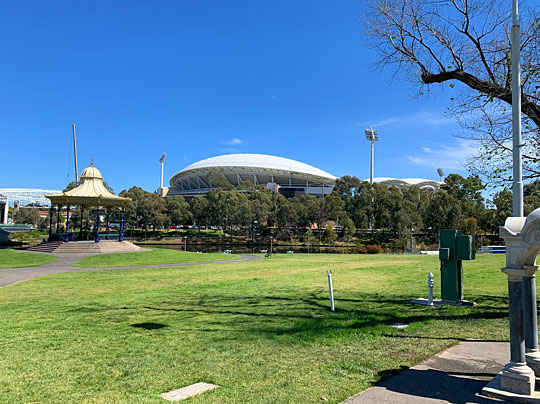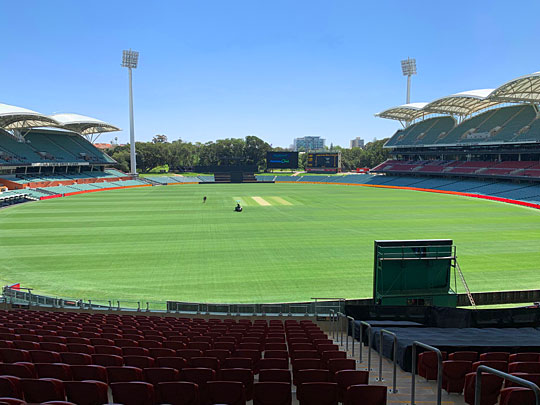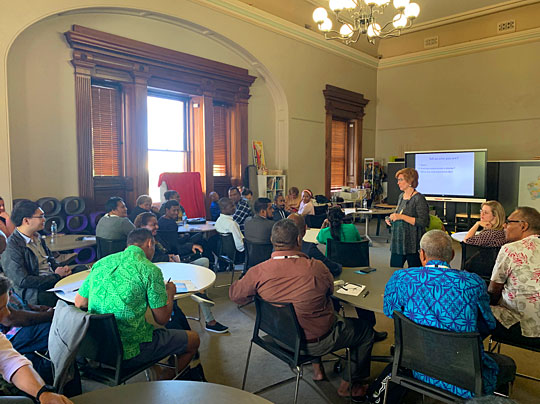ICA/PARBICA Conference Adelaide OvalAdelaide, Australia October 21-25, 2019

The International Council on Archives (ICA) in association with Pacific Regional Branch International Council on Archives (PARBICA) held their conference in Adelaide, Australia from October 21-25, 2019. The conference theme Designing the Archive was about putting people at the center of what archivists do. It provided an opportunity to explore how data and information managers, records managers and archivists are using, or can use, human-centered design approaches to ensure that what they deliver benefits to citizens, customers, stakeholders and communities. The program explored the use of empathy, creativity, innovation, experimentation, prototyping, and co-design in the development of recordkeeping systems, information governance frameworks, archival programs and services, archive buildings and spaces, or digital archives. The conference was also hosted by the Australian Society of Archivists (ASA) and Records Association of New Zealand Te Huinga Mahara (ARANZ).
On the first day of the conference I attended the PARBICA 18 General Meeting, which was held in the Institute Room of the State Library of South Australia. This was a great starting point of the week to meet many of my Pacific colleagues and friends. The meeting was informative, and we heard reports from the PARBICA President, Secretary General, and the Treasurer. We also heard what has been accomplished since the last time we met in Pacific Harbour, Fiji in September 2017. Then, most of the delegates gave a short report on the current status and concerns of their respective Archives. This is always one of my favorite parts of the general meeting, as I get an idea as to what areas the Archives throughout the Pacific regions need help. After the meeting, we all met at the University of Adelaide to tour the Henry Maude Papers. This collection comprises the extensive papers of Henry Evans (Harry) Maude, a former British colonial administrator, head of Social Development section of the South Pacific Commission, and Professor of Pacific History at the Australian National University, and of his wife, fellow researcher and string figure expert, Honor Courtney Maude.
For the next three days the conference venue changed sites to the Adelaide Oval. Established in 1871 the Adelaide Oval has long been one of Australia's most recognizable, prestigious, and venerable venues that hosts cricket, football, Australian Rules Rugby, concerts and many other major events. This was truly a very unique setting for a conference. During breaks you can sit and relax in the stands and watch the grounds crew manicure the field for an important cricket match that was to take place on the weekend after the conference. Although during the conference I attended many interesting sessions, there were two that stood out and were about Archives in the Pacific Islands. For me these were must see session. The first was titled, "Future Developments for Archives, Language and Libraries in PNG, Samoa and Tuvalu." The second "not to miss" breakout session that interested me was titled, "The Diversity of Contexts: Colonization, Languages and Geography as Barriers to Access." Pacific Islands' colleagues presented all these papers.

Later in the week starting with Thursday was when I got more involved with the conference. My colleague from Tuvalu, Noa Tapumanaia, and I gave a show and tell about our experiences during our project at the Tuvalu National Library and Archives (TNLA) from 2017 to 2018. This was held during the session titled, "FIDA- Supporter of the Development of Archives." ICA's Fund for the International Development of Archives (FIDA) provides assistance to archive professionals and institutions working in especially challenging conditions, usually in developing countries. The title of our project was "Appraising, Processing and Preserving the Public Records Collection at the Tuvalu National Library and Archives." We talked about TNLA and how the project began, planned and executed- all through pictures and photographs. Noa even showed a one-minute video about how climate change is affecting the country of Tuvalu. At the end we fielded questions from the audience who were interested about the project or about FIDA in general.
On Friday I helped conduct an all-day workshop on Emergency Management and Disaster Planning, which was partially funded by the UNESCO Japanese Fund in Trust that was available to the UNESCO Memory of the World Program (MoW). The purpose of this funding was to progress the UNESCO Global Policy Framework for sustainable preservation of documentary heritage through disaster risk reduction and management. PARBICA working with the Memory of the World Committee for Asia and the Pacific Islands (MOWCAP) sought funding for the workshop based on the PARBICA toolkit guidelines because they were consistent with the MoW objectives and the MOWCAP Pacific Action Plan. Over thirty members of PARBICA, which also included a few ICA members, attended the workshop. The workshop took place in the Inventory Room of the State Library of South Australia. Emilie Leumas, chair of the ICA Expert Group on Emergency Management and Disaster Planning, also facilitated the workshop. Although it was a long day, I believe the attendees truly enjoyed the interactive program and are now much more prepared to deal with a disaster in their respective Archives.

Overall, the conference was a huge success. It attracted more than 600 archivists and records managers worldwide. Next year, the ICA Conference organizers have an even more ambitious desire to attract five to seven thousand people to their conference in Abu Dhabi, United Arab Emirates. Nevertheless, the coming together of four major archivist groups in Adelaide truly made this year's event a special one. Many interesting archival topics and issues were discussed, and it was amazing to see how cultural heritage was being defined, preserved, shared and disseminated. The numerous workshops held on the final day also created a valuable chance to learn new ways of thinking about how archives functions. Indeed, there are a lot of things happening in the archival world. As for PARBICA, it was great to catch-up with old colleagues, and make new ones during the week. The next PARBICA meeting is slated to take place in Papua New Guinea in 2021, and I look forward to sharing new ideas with my colleagues across Oceania.

The conference logo was created through a design process involving Pijantijatjara artist Audrey Brumby and graphic designer Matthew Aldous in collaboration with Indigenu Gallery Director Tony Straccia. The painting represents people connecting and linking, going around communities talking, sharing, spreading stories and messages.
